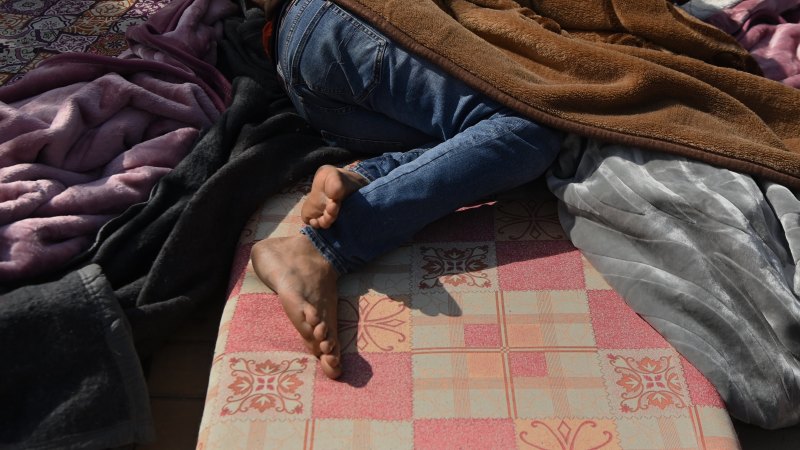
‘What does the world expect to happen?’: Fleeing Gazans in fresh bind in West Bank
October 22, 2023Save articles for later
Add articles to your saved list and come back to them any time.
Ramallah: On a basketball court that would usually be filled with the sound of laughter, desolation fills the air. The midday sun is beating down in the West Bank as Palestinian flags flutter in the breeze and white stone apartment buildings loom in the surrounding hills.
This recreational centre in Ramallah – the administrative capital of the Palestinian National Authority – now resembles a refugee camp, with mattresses arranged on the ground beside luggage.
The indoor soccer pitch is packed with men sleeping on the ground, some sheltering inside the nets. Those who haven’t secured a spot inside sleep outside.
Afraid to show faces, fearful of what comes next: Some of the Gazans in the Ramallah Recreational Complex. Credit: Kate Geraghty
Among the estimated 550 men here is Abu, a father of nine from Beit Hanon, a town in northern Gaza near the Israeli border.
A fortnight ago, Abu crossed the frontier regularly to work as a motor mechanic in Israel with the goal of making a better life for his family.
Until October 7, around 18,000 Gazans had permits to work legally in Israel, making their way over on foot through the Erez Crossing, the only way to move by land between the two.
Most of the men worked in fields such as construction, cleaning and farm labouring. The risk of exploitation and harassment was high, but these permits were prized documents.
A Palestinian could earn six times more working in Israel than in Gaza, where 46 per cent of the population is unemployed.
The work all came to a halt when Hamas terrorists stormed over the crossing using bulldozers, motorcycles and paragliders, launching a killing spree that claimed over 1300 lives and taking about 200 hostages.
Israel slammed shut the border and cancelled Gazan work permits, leaving men like Abu stranded and separated from their families. Afraid he would be arrested by Israeli authorities and locked up in jail, he paid a driver to take him to the occupied Palestinian territory of the West Bank.
Other men were handed over to police by their bosses, loaded onto buses and shipped to the West Bank, somewhere most of them had never been.
Some 550 Gazans who held Israeli work permits have taken sanctuary in the recreation complex.Credit: Kate Geraghty
Over 4300 people have since been killed in Gaza by Israeli bombing raids according to the Hamas-controlled Gaza Health Ministry. Abu doesn’t know if his family, who have been sheltering in a school, will survive the attacks and the expected ground war. “It’s terrifying,” he says of the situation in Gaza. “God only knows if I will see them again.”
Another man approaches and says that seven of his relatives have died in Gaza since the war began. Another says the family home he spent years building is now just a pile of rocks.
They want to tell their stories, but they also have questions: how much do people on the other side of the world really know about the horror unfolding in Gaza? How much do they care?
The displaced men seek comfort where they can, smoking shisha pipes and sipping coffee.
One man from Gaza, who worked as a hairdresser in Israel and fled to the West Bank with his clippers, is providing free haircuts to pass the time and do something useful.
Pictures without faces: Inside the Ramallah Recreational Complex.Credit: Kate Geraghty
But the sense of fear is inescapable: the men say Israeli troops prowl around the centre during the night and they live in terror of being arrested, possibly to be used as part of a prisoner swap with Israeli hostages in Gaza.
The men are too scared to have their faces photographed or to provide their full names, fearing it will expose them to retaliation. Since October 7, Israeli authorities have detained an estimated 700 Palestinians in the West Bank, which is controlled by Hamas’ more moderate, secular rival Fatah. The detainees include dozens of workers from Gaza.
“We have been here 13 days sleeping outside in the rain,” says one man. “It’s not safe here, we think about running away. I wish I could see my four sons and three daughters again. I don’t know if they are alive or dead.”
Another man says he hasn’t heard news from his family in Gaza for three days. With electricity supplies from Israel shut off, his son has to walk an hour each day to charge his phone using solar panels. Another man says he fears his wife, who relies on dialysis, will die because her body cannot accept the saltwater Gazans are now drinking to stay alive.
As we talk, a man enters the complex and is greeted like a hero. He is a Palestinian from Jerusalem who sheltered 70 fleeing Gazan workers in his home when the war broke out. The men are overwhelmingly critical of the Israeli government, blaming it, rather than Hamas, for their plight.
“Palestinian people, Gazan people have been living under occupation for 75 years,” the man from Jerusalem says. “Children being killed, women being killed, people denied medical services, not being able to move from place to place in their own land, What does the world expect to happen?” The men around him nod in agreement.
Another man says he wants to go home to Gaza, despite the immense danger he would face there. His safe haven in Ramallah doesn’t feel so safe. “I feel like I’m in jail here,” he says. “With Hamas, without Hamas, we will keep fighting until we find freedom.” There is so much he doesn’t know – Will his family survive the war? When will he be able to go home? – but he says he is convinced of one thing. No matter what the wage, never will he return to work in Israel again.
More coverage of the Hamas-Israel conflict
- Cascading violence: Tremors from the Hamas attacks and Israel’s response have reached far beyond the border. But what would all-out war in the Middle East look like?
- The human cost: Hamas’ massacre in Israel has traumatised – and hardened – survivors. And in Gaza, neighbourhoods have become ghost cities.
- “Hamas metro”: Inside the labyrinthine network of underground tunnels, which the Palestinian militant group has commanded beneath war-ravaged Gaza for 16 years. The covert corridors have long provided essential channels for the movement of weapons and armed combatants.
What is Hezbollah?: As fears of the conflict expanding beyond Israel and Hamas steadily rise, all eyes are on the militant group and political party that controls southern Lebanon and has been designated internationally as a terrorist group. How did it form and what does Iran have to do with it?
Get a note directly from our foreign correspondents on what’s making headlines around the world. Sign up for our weekly What in the World newsletter.
Most Viewed in World
From our partners
Source: Read Full Article





